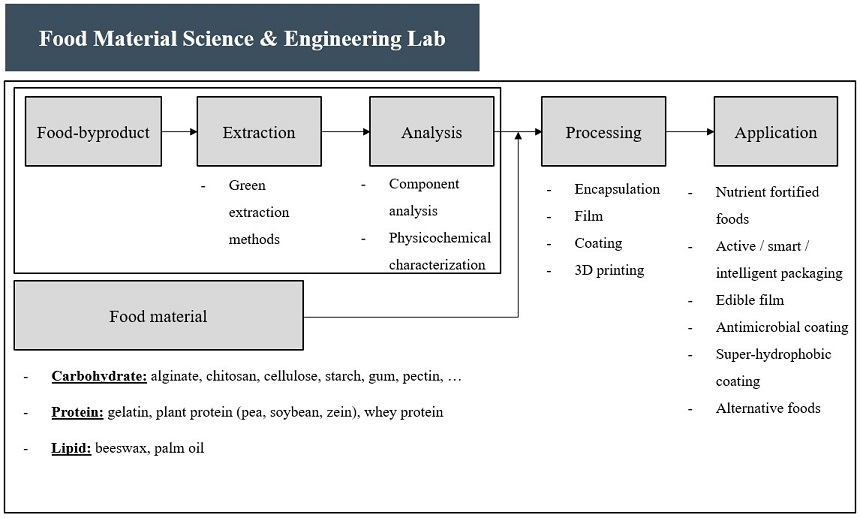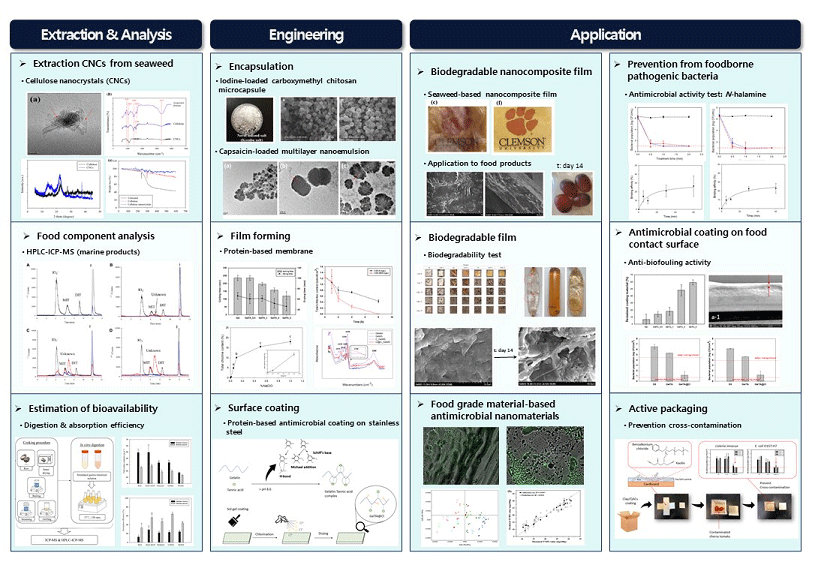대학원
연구실소개
연구관심분야
Food material engineering; biopolymer; food processing; food packaging; food safety; surface coating; green chemistry; analytical chemistry

Food Material Science & Engineering Lab
-
Food-byproduct
-
Extraction
- Green
- extraction
- methods
-
Analysis
- Component analysis
- Physicochemical characterization
-
Processing
- Encapsulation
- Film
- Coating
- 3D printing
-
Application
- Nutrient fortified foods
- Active/smart/intelligent packaging
- Edible film
- Antimicrobial coating
- Super-hydrophobic coating
- Alternative foods
-
Food material
- Carbohydrate: alginate, chitosan, cellulose, starch, gum, pectin,...
- Protein: gelatin, plant protein (pea, soybean, zein), whey protein
- Lipid: beeswax, palm oil

-
Extraction & Analysis
- Extraction CNCs from seaweed - Cellulose nanocrystals (CNCs)
- Food component analysis - HPLC-ICP-MS (marine products)
- Estimation of bioavailability - Digestion & absorption efficiency
-
Engineering
- Encapsulation
- lodine-loaded carboxymethyl chitosan microcapsule
- Capsaicin-loaded multilayer nanoemulsion
- Film forming - Protein-based membrane
- Surface coating - Protein-based antimicrobial coating on stainless steel
- Encapsulation
-
Application
- Biodegradable nanocomposite film
- Seaweed-based nanocomposite film
- Application to food products
- Biodegradable film - Biodegradability test
- Food grade material-based antimicrobial nanomaterials
- Prevention from foodborne pathogenic bacteria - Antimicrobial activity test: N-halamine
- Antimicrobial coating on food contact surface - Anti-biofouling activity
- Active packaging - Prevention cross-contamination
- Biodegradable nanocomposite film
본 연구실에서는 식품 부산물 및 폐기물에서 생산되는 식품 소재와 이들이 형성하는 콜로이드 시스템 (입자, 젤, 에멀젼 등)의 특성을 조절하고 이를 이용한 엔지니어링 기술을 연구합니다. 이를 통하여 1) 영양강화 식품 개발, 2) 친환경 포장기술 개발, 3) 항균 입자, 필름 및 코팅을 통한 식품안전성 도모, 4) edible film을 이용한 식품의 품질 개선, 5) 3D 프린터를 이용한 대체식품 개발을 연구하고자 합니다. 식품 바이오 소재에 대한 다양한 관점을 바탕으로 상호 융합적 활용을 통해 안전하고 부가가치가 높은 식품 산업 관련 바이오 소재 개발 및 첨단공학 기술을 바탕으로 한 신규 식품소재 공정 및 소재 가공 공정의 개발을 연구적 목표로 정하고 있습니다. 더불어 이러한 연구들로, 학생들에게 식품공학 분야 내에서의 고분자 공학 (polymer engineering), 재료과학 (material science), 분자 공학 (molecular engineering), 유기화학 (organic chemistry), 식품 미생물학 (food microbiology)의 융합적 사고를 할 수 있는 능력을 배양시켜 주는 것을 교육적 목표로 삼고 있습니다.
Dr. Doh is interested in biopolymer in food-grade materials and developing food material science and engineering techniques for the establishment of eco-friendly and sustainable engineering by developing the colloidal system (particle, gel, and emulsion). Dr. Doh’s lab would handle food material science and engineering using a combination of interdisciplinary approaches encompassing polymer engineering, material science, and analytical chemistry to study the following key research areas. The research interest of the laboratory can be broadly classified into five main categories: 1) Development of nutrition-fortified foods, 2) Formulation of eco-friendly and sustainable packaging materials, 3) Establishment of antimicrobial particle, film, coating system, 4) Increasing the food quality through edible film, 5) Development of alternative food using a 3D printer. The goal of the research plans is to develop technologies for addressing key issues in the fields of food material science, food safety, and food for health initiatives. The projects will provide students with skills in areas of polymer engineering, material science, molecular engineering, surface chemistry, organic chemistry, and microbiology with a strong foundation in food engineering.
- 주소 : 서울시 서대문구 이화여대길 52 이화여자대학교 (사무실) 진선미관 316호
- 연락처 : 02-3277-3104 (도한솔 교수 연구실) / hdoh@ewha.ac.kr (도한솔 교수)
- 홈페이지 주소: https://cmsfox.ewha.ac.kr/fmelab/index.do
